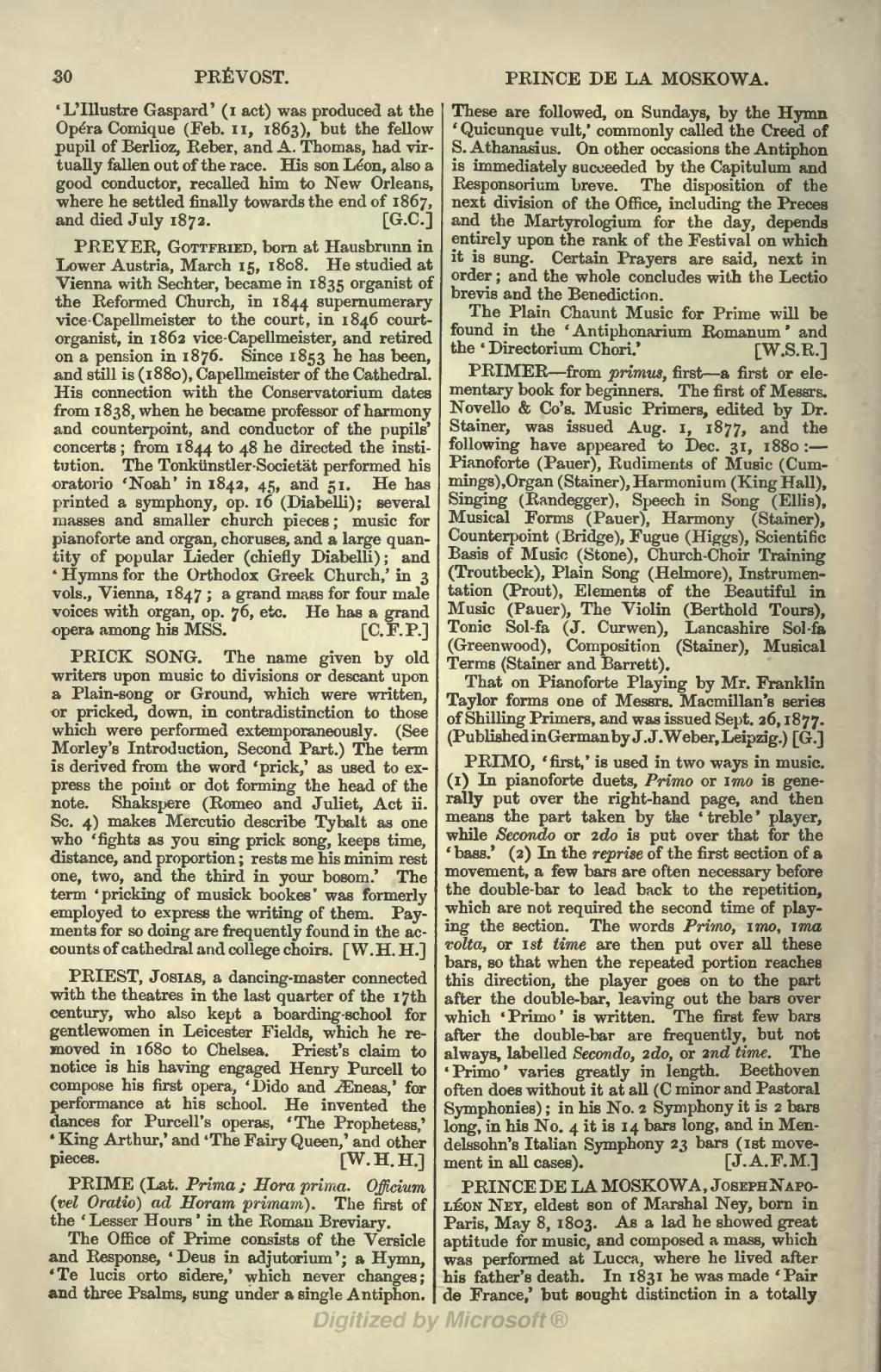'L'lllustre Gaspard' (1 act) was produced at the Opéra Comique (Feb. 11, 1863), but the fellow pupil of Berlioz, Reber, and A. Thomas, had virtually fallen out of the race. His son Léon, also a good conductor, recalled him to New Orleans, where he settled finally towards the end of 1867, and died July 1872.
[ G. C. ]
PREYER, Gottfried, born at Hausbrunn in Lower Austria, March 15, 1808 [App. p.751 "May 15, 1809"]. He studied at Vienna with Sechter, became in 1835 organist of the Reformed Church, in 1844 supernumerary vice-Capellmeister to the court, in 1846 court-organist, in 1862 vice-Capellmeister, and retired on a pension in 1876. Since 1853 he has been, and still is (1880), Capellmeister of the Cathedral. His connection with the Conservatorium dates from 1838, when he became professor of harmony and counterpoint, and conductor of the pupils' concerts; from 1844 to 48 he directed the institution. The Tonkünstler-Societät performed his oratorio 'Noah' in 1842, 45, and 51. He has printed a symphony, op. 16 (Diabelli); several masses and smaller church pieces; music for pianoforte and organ, choruses, and a large quantity of popular Lieder (chiefly Diabelli); and 'Hymns for the Orthodox Greek Church,' in 3 vols., Vienna, 1847; a grand mass for four male voices with organ, op. 76, etc. He has a grand opera among his MSS.
[ C. F. P. ]
PRICK SONG. The name given by old writers upon music to divisions or descant upon a Plain-song or Ground, which were written, or pricked, down, in contradistinction to those which were performed extemporaneously. (See Morley's Introduction, Second Part.) The term is derived from the word 'prick,' as used to express the point or dot forming the head of the note. Shakspere (Romeo and Juliet, Act ii. Sc. 4) makes Mercutio describe Tybalt as one who 'fights as you sing prick song, keeps time, distance, and proportion; rests me his minim rest one, two, and the third in your bosom.' The term 'pricking of musick bookes' was formerly employed to express the writing of them. Payments for so doing are frequently found in the accounts of cathedral and college choirs.
[ W. H. H.
PRIEST, Josias, a dancing-master connected with the theatres in the last quarter of the 17th century, who also kept a boarding-school for gentlewomen in Leicester Fields, which he removed in 1680 to Chelsea. Priest's claim to notice is his having engaged Henry Purcell to compose his first opera, 'Dido and Æneas,' for performance at his school. He invented the dances for Purcell's operas, 'The Prophetess,' King Arthur,' and 'The Fairy Queen,' and other pieces.
[ W. H. H. ]
PRIME (Lat. Prima; Hora prima. Officium (vel Oratio) ad Horam primam). The first of the 'Lesser Hours' in the Roman Breviary.
The Office of Prime consists of the Versicle and Response, 'Deus in adjutorium'; a Hymn, 'Te lucis orto sidere,' which never changes; and three Psalms, sung under a single Antiphon. These are followed, on Sundays, by the Hymn 'Quicunque vult,' commonly called the Creed of S. Athanasius. On other occasions the Antiphon is immediately succeeded by the Capitulum and Responsorium breve. The disposition of the next division of the Office, including the Preces and the Martyrologium for the day, depends entirely upon the rank of the Festival on which it is sung. Certain Prayers are said, next in order; and the whole concludes with the Lectio brevis and the Benediction.
The Plain Chaunt Music for Prime will be found in the 'Antiphonarium Romanum' and the 'Directorium Chori.'
[ W. S. R. ]
PRIMER—from primus, first—a first or elementary book for beginners. The first of Messrs. Novello & Co's. Music Primers, edited by Dr. Stainer, was issued Aug. 1, 1877, and the following have appeared to Dec. 31, 1880:—Pianoforte (Pauer), Rudiments of Music (Cummings), Organ (Stainer), Harmonium (King Hall), Singing (Randegger), Speech in Song (Ellis), Musical Forms (Pauer), Harmony (Stainer), Counterpoint (Bridge), Fugue (Higgs), Scientific Basis of Music (Stone), Church-Choir Training (Troutbeck), Plain Song (Helmore), Instrumentation (Prout), Elements of the Beautiful in Music (Pauer), The Violin (Berthold Tours), Tonic Sol-fa (J. Curwen), Lancashire Sol-fa (Greenwood), Composition (Stainer), Musical Terms (Stainer and Barrett).
That on Pianoforte Playing by Mr. Franklin Taylor forms one of Messrs. Macmillan's series of Shilling Primers, and was issued Sept. 26, 1877. (Published in German by J.J.Weber, Leipzig.)
[ G. ]
PRIMO, 'first,' is used in two ways in music, (1) In pianoforte duets, Primo or 1mo is generally put over the right-hand page, and then means the part taken by the 'treble' player, while Secondo or 2do is put over that for the 'bass.' (2) In the reprise of the first section of a movement, a few bars are often necessary before the double-bar to lead back to the repetition, which are not required the second time of playing the section. The words Primo, 1mo, 1ma volta, or 1st time are then put over all these bars, so that when the repeated portion reaches this direction, the player goes on to the part after the double-bar, leaving out the bars over which 'Primo' is written. The first few bars after the double-bar are frequently, but not always, labelled Secondo, 2do, or 2nd time. The 'Primo' varies greatly in length. Beethoven often does without it at all (C minor and Pastoral Symphonies); in his No. 2 Symphony it is 2 bars Long, in his No. 4 it is 14 bars long, and in Mendelssohn's Italian Symphony 23 bars (1st movement in all cases).
[ J. A. F. M. ]
PRINCE DE LA MOSKOWA, Joseph Napoléon Ney, eldest son of Marshal Ney, born in Paris, May 8, 1803. As a lad he showed great aptitude for music, and composed a mass, which was performed at Lucca, where he lived after his father's death. In 1831 he was made 'Pair de France,' but sought distinction in a totally

